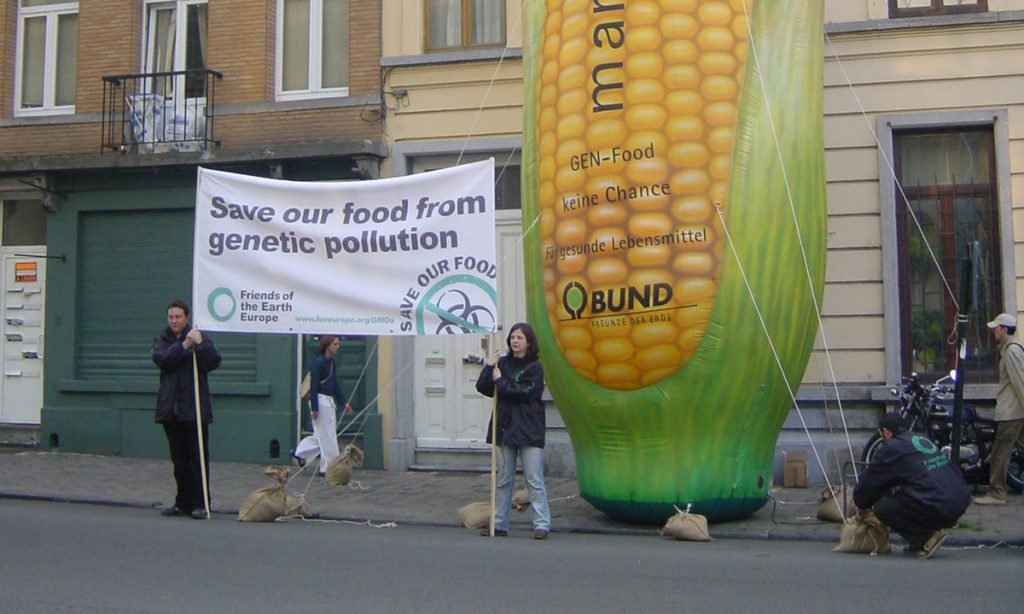Brussels, 25 February – European countries today failed to reach agreement on whether more controversial genetically modified maize can be grown in Europe. [1] [2]
It is the first time in ten years that a type of new genetically modified (GM) maize has been put to the vote in Europe. The vote was forced by legal action by the biotech company Pioneer that produces one of the maize in question. [3] [4]
European Environment Ministers [5] and the European Commission [6] had previously concluded that GMO risk assessment in the EU is not fulfilling legal requirements, and that crops should also be assessed under EU pesticide laws. The European Commission’s proposals to authorise the cultivation of these GM maize disregards its earlier recommendations.
Helen Holder, European GMO campaign coordinator at Friends of the Earth Europe said: “Putting these two genetically modified crops to the vote is untimely and inappropriate. EU Ministers recently concluded that GMO risk assessments are not done properly in Europe and that improvements must be put in place.
“The GM maize are genetically modified to tolerate a pesticide that the European Parliament and EU ministers have agreed should be phased out because of risks to on health. These crops should not be grown in Europe.
“Data from government and industry sources shows GM crops are performing badly in Europe whilst green farming is growing rapidly and creating jobs. Allowing this genetically modified maize to be grown in the EU will put sectors at risk that are otherwise showing real economic potential.”
The two maize are controversial for a number of reasons:
– Both are genetically modified to be tolerant to a pesticide – glufosinate – that the European Parliament and the European Council have recently agreed to ban in the EU because of its toxicity [7]
– Both are ‘Bt crops’ that produce a toxin to kills insects (Bt-toxin) around which there is considerable uncertainty of its environmental impacts [8]
– ‘Bt crops’ also cause insect resistance to the toxin they produce thus potentially posing problems for farmers
– In 2007, nearly 40 research scientists wrote an open letter to the Environment Commissioner, Stavros Dimas, stating that these crops should not be grown in Europe
***
NOTES TO EDITORS:
[1] Today’s vote at the Regulatory Committee was a ‘non qualified majority’ vote. Under EU decision making rules, weighted voting means that a minimum number of votes is needed for a decision to be taken. The failure to reach the minimum level of agreement today means the Commission’s proposals that the two national bans be dropped will betransferred to an upcoming EU Environment or Agriculture Council for Ministers to vote on. [2] Syngenta’s Bt 11 maize and Pioneer’s 1507 maize [3] Only one other GM crop for cultivation has come up for vote at EU level, BASF’s GM potato modified for starch production and aimed for industrial use. EU countries failed to agree at a first vote and the application was later sent back to the European Food Safety Agency because of errors in the evaluation of the usage of antibiotic resistance marker genes. [4] The European Commission has put forward the proposal to grow the two maize in the EU as part of a deal following legal action by Pioneer to force the Commission to put the controversial maize to the vote. [5] Council Conclusions on Genetically Modified Organisms (GMOs), 2912th Environment Council meeting, Brussels, 4 December 2008 http://www.consilium.europa.eu/ueDocs/cms_Data/docs/pressData/en/envir/104509.pdf [6] Letter of Mr. Madelin and Delbeke of 8 September 2008 to Ms Catherine Geslain-Lanéelle http://www.efsa.europa.eu/cs/BlobServer/DocumentSet/gmo_response_european_commission_en.pdf [7] On 13 January 2009 the European Parliament agreed with the Council on the text of the Regulation concerning the placing of plant protection products on the market and repealing Council Directives 79/117/EEC and 91/414/EEC. The Regulation’s criteria identify glufosinate as one of 22 substances that must be phased out in the EU because of the serious health and environmental risks it poses. [8] Impacts on non target organisms, soil health and aquatic organisms are uncertain.







